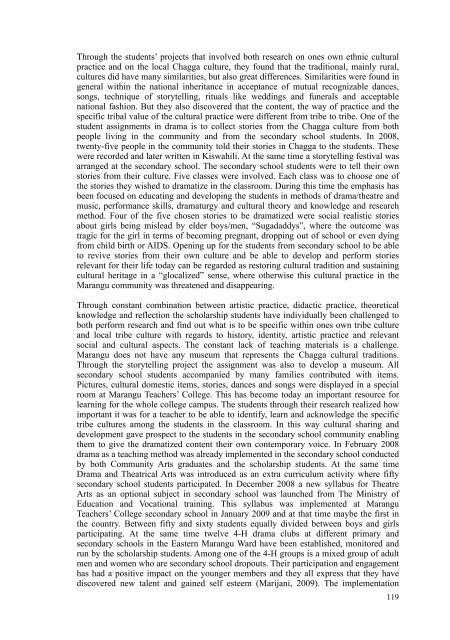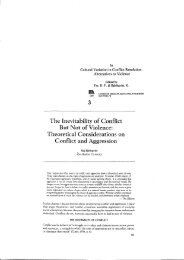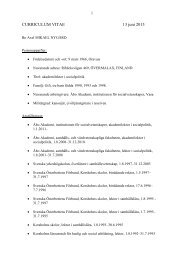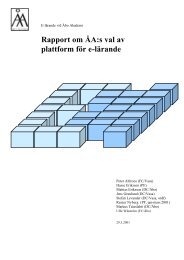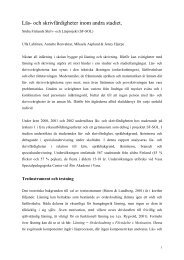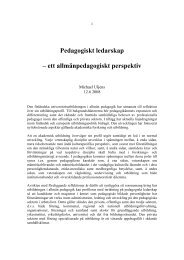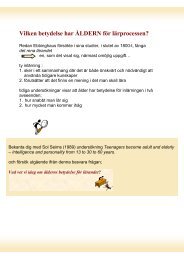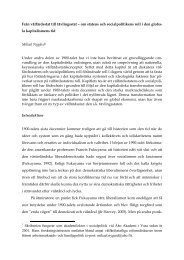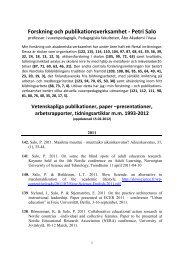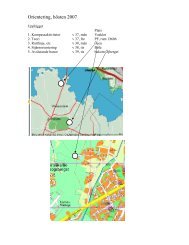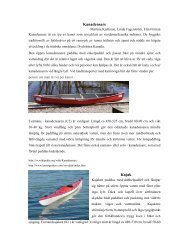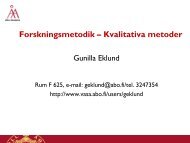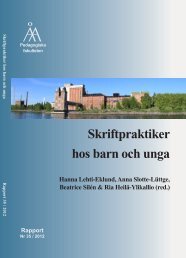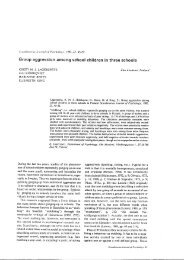Drama Boreale - Åbo Akademi
Drama Boreale - Åbo Akademi
Drama Boreale - Åbo Akademi
You also want an ePaper? Increase the reach of your titles
YUMPU automatically turns print PDFs into web optimized ePapers that Google loves.
Through the students’ projects that involved both research on ones own ethnic cultural<br />
practice and on the local Chagga culture, they found that the traditional, mainly rural,<br />
cultures did have many similarities, but also great differences. Similarities were found in<br />
general within the national inheritance in acceptance of mutual recognizable dances,<br />
songs, technique of storytelling, rituals like weddings and funerals and acceptable<br />
national fashion. But they also discovered that the content, the way of practice and the<br />
specific tribal value of the cultural practice were different from tribe to tribe. One of the<br />
student assignments in drama is to collect stories from the Chagga culture from both<br />
people living in the community and from the secondary school students. In 2008,<br />
twenty-five people in the community told their stories in Chagga to the students. These<br />
were recorded and later written in Kiswahili. At the same time a storytelling festival was<br />
arranged at the secondary school. The secondary school students were to tell their own<br />
stories from their culture. Five classes were involved. Each class was to choose one of<br />
the stories they wished to dramatize in the classroom. During this time the emphasis has<br />
been focused on educating and developing the students in methods of drama/theatre and<br />
music, performance skills, dramaturgy and cultural theory and knowledge and research<br />
method. Four of the five chosen stories to be dramatized were social realistic stories<br />
about girls being mislead by elder boys/men, “Sugadaddys”, where the outcome was<br />
tragic for the girl in terms of becoming pregnant, dropping out of school or even dying<br />
from child birth or AIDS. Opening up for the students from secondary school to be able<br />
to revive stories from their own culture and be able to develop and perform stories<br />
relevant for their life today can be regarded as restoring cultural tradition and sustaining<br />
cultural heritage in a “glocalized” sense, where otherwise this cultural practice in the<br />
Marangu community was threatened and disappearing.<br />
Through constant combination between artistic practice, didactic practice, theoretical<br />
knowledge and reflection the scholarship students have individually been challenged to<br />
both perform research and find out what is to be specific within ones own tribe culture<br />
and local tribe culture with regards to history, identity, artistic practice and relevant<br />
social and cultural aspects. The constant lack of teaching materials is a challenge.<br />
Marangu does not have any museum that represents the Chagga cultural traditions.<br />
Through the storytelling project the assignment was also to develop a museum. All<br />
secondary school students accompanied by many families contributed with items.<br />
Pictures, cultural domestic items, stories, dances and songs were displayed in a special<br />
room at Marangu Teachers’ College. This has become today an important resource for<br />
learning for the whole college campus. The students through their research realized how<br />
important it was for a teacher to be able to identify, learn and acknowledge the specific<br />
tribe cultures among the students in the classroom. In this way cultural sharing and<br />
development gave prospect to the students in the secondary school community enabling<br />
them to give the dramatized content their own contemporary voice. In February 2008<br />
drama as a teaching method was already implemented in the secondary school conducted<br />
by both Community Arts graduates and the scholarship students. At the same time<br />
<strong>Drama</strong> and Theatrical Arts was introduced as an extra curriculum activity where fifty<br />
secondary school students participated. In December 2008 a new syllabus for Theatre<br />
Arts as an optional subject in secondary school was launched from The Ministry of<br />
Education and Vocational training. This syllabus was implemented at Marangu<br />
Teachers’ College secondary school in January 2009 and at that time maybe the first in<br />
the country. Between fifty and sixty students equally divided between boys and girls<br />
participating. At the same time twelve 4-H drama clubs at different primary and<br />
secondary schools in the Eastern Marangu Ward have been established, monitored and<br />
run by the scholarship students. Among one of the 4-H groups is a mixed group of adult<br />
men and women who are secondary school dropouts. Their participation and engagement<br />
has had a positive impact on the younger members and they all express that they have<br />
discovered new talent and gained self esteem (Marijani, 2009). The implementation<br />
119


